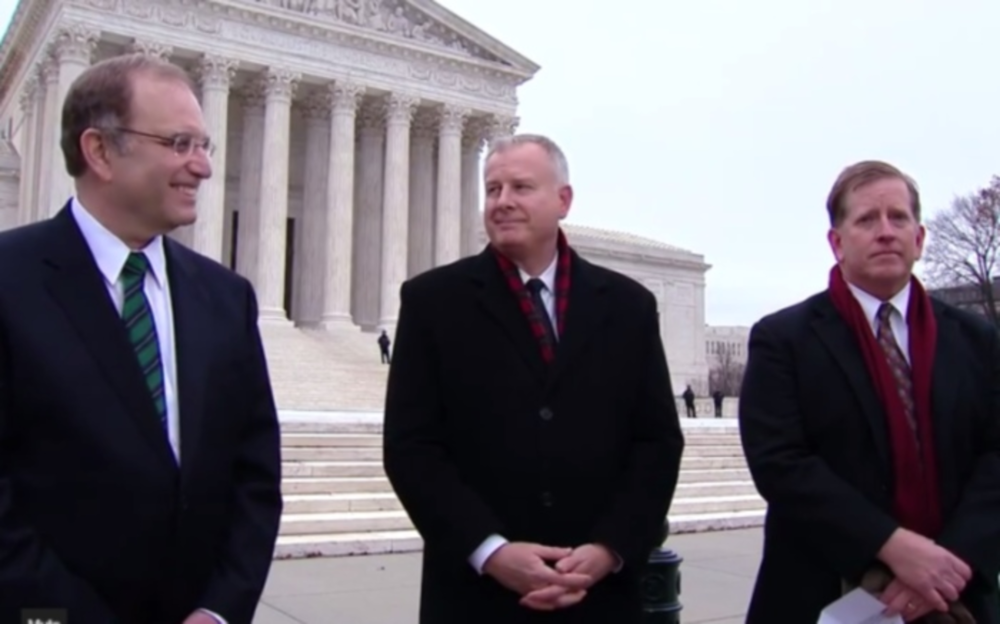DMA counsel George Isaacson (l.) and president Tom Benton (c.) in 2014
A pall now hangs over the historic Supreme Court decision won by the Direct Marketing Association last year. DMA v. Brohl ensured the right of businesses to seek redress of state legal decisions in federal courts, but that case was necessitated by DMA’s effort to prevent Colorado from collecting sales taxes from transactions involving out-of-state merchants. One year and a couple of court decisions later, and it appears Colorado has been cleared to do just that.
DMA returned to district court in Colorado after Brohl and won a summary judgment based on its contention that the remote tax law violated the Commerce Clause by treating out-of-state businesses—in this case catalogers and Internet retailers—differently from in-state concerns. State tax commissioner Barbara Brohl appealed that decision to the Tenth Circuit Court and, on February 22, Judges Mary Beck Briscoe, Neil Gorsuch, and Scott Matheson found for Colorado, disagreeing that the law violated the Commerce Clause.
It was judges Briscoe, Gorsuch, and Matheson and the Tenth Circuit that, in 2013, moved DMA to petition the Supreme Court when it reinstated the remote tax, citing a clause in the Tax Injunction Act holding that district courts “shall not enjoin, suspend, or restrain the assessment, levy, or collection.” Nineteen judges sit on the Tenth Circuit, which employs en banc rules that allow three or four judges to decide for the entire court. Arguing that these three jurists already had their minds made up on the subject, the DMA submitted an en banc review to the court, which rejected it last week. To sum up: Colorado’s remote sales tax is cleared for approval and out-of-state merchants must soon start reporting purchases.
“The Tenth Circuit will remand the case back to the federal district court and we anticipate it will lift the stay on enforcement of the [tax law]. The only course left for us now is to appeal the Tenth Circuit’s decision to the U.S. Supreme court and say they misinterpreted the Commerce Clause,” says DMA VP of Advocacy Chris Oswald. DMA originally got the law nullified in district court by arguing that it violated the Commerce Clause’s admonition that all states be treated equally.
The National Retail Federation and other brick-and-mortal retail interests have long lobbied Congress for a law that would assess taxes on websites and catalog businesses that, they argue, have an unfair advantage by not having to collect state taxes. In 2013 the Senate passed the Marketplace Fairness Act mandating such collection, but it was tabled by the House of Representatives. States faced with mounting budgetary challenges took up the cause. Colorado has since been followed by Alabama, which on January 1 began enforcing a law mandating that businesses transacting more than $250,000 of business a year in the state begin reporting purchases. Alabama’s tax commissioner Juile Magee has openly declared that the state wants to force direct challenge to the decades-old Quill Corp. v. North Dakota Supreme Court decision, which required that sellers have a physical “nexus” in a state before they can be taxed there.
Minus a reversal of Quill by the Supreme Court, only legislation can negate it, and Congress doesn’t seem poised to pass any controversial legislation this election year. Consequently, remote sellers will have to deal with demands from Alabama, Colorado, and any other states wishing to get in on the sales tax free-for-all. The remote sales tax battle is at a crossroads.
“We’re getting to the endgame of this issue and the states are doing all they can to force a solution. Until and unless Congress makes a change to the law of the land, Quill stands. But the pressure on remote sellers is starting. They need a federal solution,” says Hamilton Davison, president and executive director of the American Catalog Mailers Association, which has joined with other remote seller organizations to push for a simplified tax plan that can be employed by all 50 states.
New hope for such a plan bloomed in mid-March, when the U.S. Chamber of Commerce sent a letter to House Judiciary Committee Chairman Bob Goodlatte (R-VA) urging him to get back to work on tax simplification immediately. Goodlatte has been a major proponent of legislation that includes a prudent and workable situation for out-of-state tax collection.
“The lack of movement from Congress on the issue of remote sales tax collection has left states, local governments, and our merchants with no choice but to seek disjointed and confusing remedies through individual state activity,” read the letter, which also was signed by several other trade associations.” The business community is highly concerned that these state efforts could lead to the issue being decided by the courts. Further, this state-by-state approach prevents businesses from benefiting from simplification measures such as uniform definitions or free tax software that could be achieved by federal legislation.”
Because Chamber of Commerce membership includes brick-and-mortar retailers, the letter resounded loudly among parties involved in the issue. “That’s a huge shift in position on the Marketplace Fairness Act from that faction. It shows it’s possible there’s a solution all sides can agree to,” Davison said.
Congress may be unwilling to take that ball and run with it, but Alabama certainly isn’t, and its sideline dash may only be cut short by a return to the Supreme Court by the DMA. Supreme Court challenges are expensive, however, and the DMA will no doubt be looking for more Internet retailers to stand up against the states and help foot the bill.
Read the full text of the Chamber of Commerce letter to Rep. Goodlatte.








